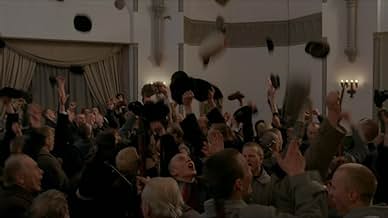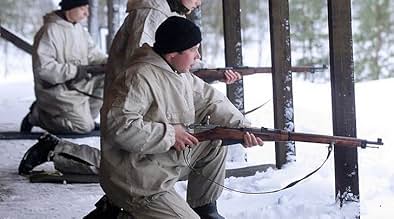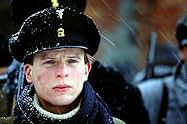Nimed marmortahvlil
- 2002
- 1h 35min
VALUTAZIONE IMDb
7,0/10
2400
LA TUA VALUTAZIONE
Aggiungi una trama nella tua linguaThis movie is about the Estonian War of Independence (1918-1920), specifically the students fighting on the nationalist side, but also shown the conflict between two ideologies (Estonian nat... Leggi tuttoThis movie is about the Estonian War of Independence (1918-1920), specifically the students fighting on the nationalist side, but also shown the conflict between two ideologies (Estonian nationalism and communism).This movie is about the Estonian War of Independence (1918-1920), specifically the students fighting on the nationalist side, but also shown the conflict between two ideologies (Estonian nationalism and communism).
- Regia
- Sceneggiatura
- Star
- Premi
- 1 candidatura in totale
Hele Kõrve
- Marta
- (as Hele Kõre)
Bert Raudsep
- Käämer
- (as Bert Raudsepp)
Recensioni in evidenza
7jnk9
While many of us know the general outlines of World War I and of the fate of the Baltic republics up until their regained independence in the early 1990's, this movie is a valuable addition of flesh and blood to a complicated historic phase: the fight for the Estonian territory. Among the fighting parties: Estonians, "red" Soviet Russians, "white" Russians, Germans, Finns and Latvians. Add to this youthful idealism, a light romantic episode and lots of atmosphere and you will agree that it is well worth its 90 minutes.
The film is especially interesting to anyone with an interest in World War I, Soviet/Russian history or the Baltic region but just as much to anyone interested in more nuanced war/ action films.
The film is especially interesting to anyone with an interest in World War I, Soviet/Russian history or the Baltic region but just as much to anyone interested in more nuanced war/ action films.
I was really looking forward to see this movie. When finally I saw it on TV in Latvia I thought that Estonians have really done it well. Of course it isn't masterpiece but history also is not as beautiful as we would want to see it. 5 countries around the Baltic sea gained their independence in those years (Poland, Lithuania, Latvia, Estonia, Finland)and each deserves to tell their own story to the world. For me it was a beautiful story about young people and the decisions they must make in crucial situations. Unfortunately, they couldn't make the same decisions when they were older and experienced (or maybe they couldn't because of it). For me it was interesting to see the portrait of Latvians in the war against Estonia. As one Finnish guy said he didn't understand why Latvians fought against Estonia. It was because those Latvians weren't supporters of independent Latvia. Latvia's real army wasn't fighting against Estonia. As it is for Finland we Latvians also must say thanks that independent Estonia later helped to fight against both the Soviets and the remains of German army.That in territory of Estonia was formed part of the independent Latvian army. These Latvians showed in this movie were communists who fought to build communism in Latvia. At that time there were 3 different governments in Latvia (1st independent Latvian, 2nd communist government, 3rd German-orientated government) so it is complicated not only for foreigners to understand but for Latvians who don't know history so well too.
The story is set in 1919, just after WWI has ended and the reds took over half of Europe. I wouldn't call them Russians, as you'll find out from the movie, that besides Russians there were Latvians and even Estonians in the red army. Unfortunately history repeats itself, in war it happens that brother fights against brother, or blood against blood.
It's a patriotic movie, of course. Estonians, as many other nations in the world fought for their freedom. What I liked in this movie is that it gave back very well the atmosphere of that time (excellent photography, and CGI perhaps) and also depicted very nicely the Estonian coutryside. Watching this movie I felt the urge to visit this country. Also liked very much that the film didn't want to make heroes. In contrary, it showed the weekness of these young students, the fear they felt being in war, killing other people. They were just victims of the war.
I bet this is one of the highest budgeted Estonian movies. But still very low budgeted comparing to American movies of the same category. So don't expect the same war scenes. However I liked it, as it is.
Only thing I can criticize in this movie is that the story is a bit too simple, too obvious. That's why I rated it 7/10. However it's an outstanding movie.
It's a patriotic movie, of course. Estonians, as many other nations in the world fought for their freedom. What I liked in this movie is that it gave back very well the atmosphere of that time (excellent photography, and CGI perhaps) and also depicted very nicely the Estonian coutryside. Watching this movie I felt the urge to visit this country. Also liked very much that the film didn't want to make heroes. In contrary, it showed the weekness of these young students, the fear they felt being in war, killing other people. They were just victims of the war.
I bet this is one of the highest budgeted Estonian movies. But still very low budgeted comparing to American movies of the same category. So don't expect the same war scenes. However I liked it, as it is.
Only thing I can criticize in this movie is that the story is a bit too simple, too obvious. That's why I rated it 7/10. However it's an outstanding movie.
Estonians see this film in a little different light than the other people. As a Finn I think Estonians should be proud of this film even if it's not necessarily even a great movie in pure artistic sense. I watched this film with sentiment and that's why I rate it so high. Estonian history concerns us Finns too and we're sorry that you suffered from Russian rule for so long time. We Finns are also happy that you managed to fend off the Red Army in 1918, for their next target would definitely been Finland. The Red Danger was over only in 1920 with the Tarto Treaty, which meant the end of enmities with the Soviet Union. That treaty was signed by both Finns and Estonians and one Finnish General has said that it was only that contract that ended the Finnish Civil War too. He meant that the Estonian war for Freedom was a part of Finnish war for Freedom as well.
I consider 'Nimed Marmortahvlil' as a very interesting movie and I don't think many Finns will disagree with me. The film has been broadcast in Finland twice and I have it on DVD, because it has a special value for me. I confess I might like it less if Peter Franzén had not played in the film. I also admit that the action scenes are not very great: there are over-acting and over-dramatizing but using that ancient light machine-gun in the final battle is interesting. The informal nature of the Estonian army is also notable as they all were just young volunteers without any military training. The action also happens in a minor scale, there is no real epic, and the event frame is somewhat odd to me. I don't figure out what the clock is symbolizing and what are those Latvians doing in Estonia except fighting, of course. Well, I guess the clock symbolizes the battle for Freedom in some sense and the Latvians are fighting for the Communism and not for Latvia. Despite these 'grand mysteries' I find this film very special.
I consider 'Nimed Marmortahvlil' as a very interesting movie and I don't think many Finns will disagree with me. The film has been broadcast in Finland twice and I have it on DVD, because it has a special value for me. I confess I might like it less if Peter Franzén had not played in the film. I also admit that the action scenes are not very great: there are over-acting and over-dramatizing but using that ancient light machine-gun in the final battle is interesting. The informal nature of the Estonian army is also notable as they all were just young volunteers without any military training. The action also happens in a minor scale, there is no real epic, and the event frame is somewhat odd to me. I don't figure out what the clock is symbolizing and what are those Latvians doing in Estonia except fighting, of course. Well, I guess the clock symbolizes the battle for Freedom in some sense and the Latvians are fighting for the Communism and not for Latvia. Despite these 'grand mysteries' I find this film very special.
The movie is nice, if you want to give it a credit just because it is one of the rare chances to see Estonian cinema. It is touching and somewhat sentimental, though the director managed to avoid too cheesy holliwoodish scene. The main plus is the touching feeling it evokes when you think about those young lads who got in the civil war and have to fight the outnumbering enemy. There is a love story, beautiful girl, but nothing really happens. There is a token brother-against-brother theme, that is supposed to show the brutal nature of the civil war. There are battle scenes, but the main battle scene against Latvians is too over dramatized and extremely unrealistic. In general, it's OK if you don't start thinking how in reality those battles would be possible. If you start thinking it seems extremely surrealistic and devoid of any resemblance of what the battle would be in the real war. Thus, some 10 young students lying in the half trench seem to stop the whole company of mighty Latvian Reds (those guys hugely contributed to the victory of REds in Russia). The movie ends abruptly, and you have a feeling that something is missing. As for historical part, it's interesting that most Estonian/Finnish spectators immediately see it as us (Estonians) fighting them (Evil Russians). The movie itself doesn't really show much Russians. Most Reds are actually Estonian. Another thing is that the Civil war in Estonia (and Finland) is often presented as Liberation war, while in fact it was a Civil war. Russians played a minor role in both countries. And it was a part of one giant civil war going on in the whole disintegrating Russian empire with Reds fighting Whites. So the words appearing in the beginning of the movie and saying that Soviet Russia wanted to establish itself as a European power (implying that Soviet Russia invaded Estonia) have more to do with current Estonian political situation than with the history.
Lo sapevi?
- BlooperThere's a surfaced road in one scene, but in Tartu in 1918 there were no tarmac roads.
- ConnessioniFeatured in Welcome to Estonia (2002)
I più visti
Accedi per valutare e creare un elenco di titoli salvati per ottenere consigli personalizzati
Dettagli
- Data di uscita
- Paesi di origine
- Siti ufficiali
- Lingue
- Celebre anche come
- Names Engraved in Marble
- Luoghi delle riprese
- Aziende produttrici
- Vedi altri crediti dell’azienda su IMDbPro
Botteghino
- Budget
- 24.000.000 EEK (previsto)
- Lordo in tutto il mondo
- 83.112 USD
- Tempo di esecuzione1 ora 35 minuti
- Colore
- Mix di suoni
- Proporzioni
- 1.85 : 1
Contribuisci a questa pagina
Suggerisci una modifica o aggiungi i contenuti mancanti






















